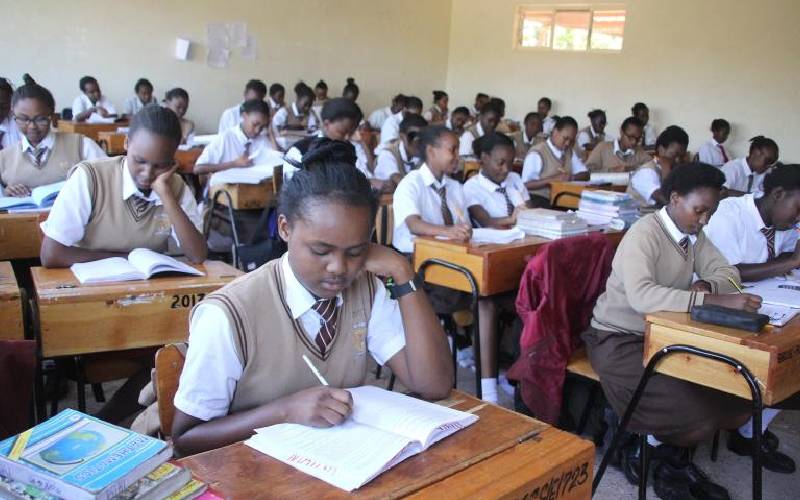
Students in a classroom. Photo/The Standard
By Newsflash Reporter
More than 1.2 million Grade 9 learners are expected to sit the first-ever Kenya Junior School Education Assessment (KJSEA) in November, a landmark step in the Competency-Based Education (CBE) rollout.
The assessment will pave the way for their transition to senior school in January 2026.
The pioneer group under CBE will be evaluated to align them with their future career pathways. Kenya has adopted three options at senior school level: Social Sciences, Arts and Sports, and Science, Technology, Engineering and Mathematics (STEM). Unlike most institutions, national schools will be required to offer all three, thanks to their advanced infrastructure and resources.
Assessment structure and career guidance
According to Kenya National Examination Council (Knec) Chief Executive Officer Dr David Njengere, the KJSEA will be a summative evaluation concluding a cycle that began in Grade 6. He explained that the Kenya Primary School Education Assessment (KPSEA) already contributed 20 per cent, while another 20 per cent came from school-based assessments in Grades 7 and 8. The upcoming KJSEA will account for the final 60 per cent of the learner’s evaluation.
For students pursuing the Arts and Sports pathway, portfolios created through music, drama, athletics and similar activities will complement their final test results.
Read more:Shock as schools receive Sh87 as capitation
At the recent Kenya Music Festival State Concert in Sagana, Dr Njengere cited the outstanding performance of a girl from Migori County as an example of how such portfolios already help guide learners into suitable pathways.
He clarified that portfolios go beyond achievements to reflect learner interests. “One could be a skilled footballer but may not wish to pursue it as a career. Parents and schools must avoid imposing careers and instead guide learners towards areas that match both interest and ability,” he said. Forcing unsuitable pathways, he warned, risks frustrating learners.
Dr Njengere stressed that junior school should focus on exploration, while senior school is where learners begin real specialisation. “The strength of a school should not only be judged by grades but by how well it helps learners find pathways suited to their potential,” he said.
Credibility concerns in placement
Addressing concerns about assessment credibility, Dr Njengere defended the system against claims of teacher manipulation. He revealed that in 2019, when Grade 9 learners first undertook school-based assessments, Knec directly received raw scores without external monitoring. Out of 1.2 million learners, only 600 achieved full marks, while the national average was between 9 and 9.5 out of 20. “The data clearly shows no evidence of inflated scores,” he maintained.
Read more: Kenya Forgotten Schools: Education in arid regions
However, school heads remain uneasy. Through their National Schools Forum, principals have questioned the fairness of relying heavily on school-based assessments for senior school placement. Kagumo High School Chief Principal Dr Silas Mwirigi voiced their fears, arguing that with 60 per cent of marks coming from school-administered tests, teachers may feel compelled to exaggerate scores so that their students secure slots in top national schools.



